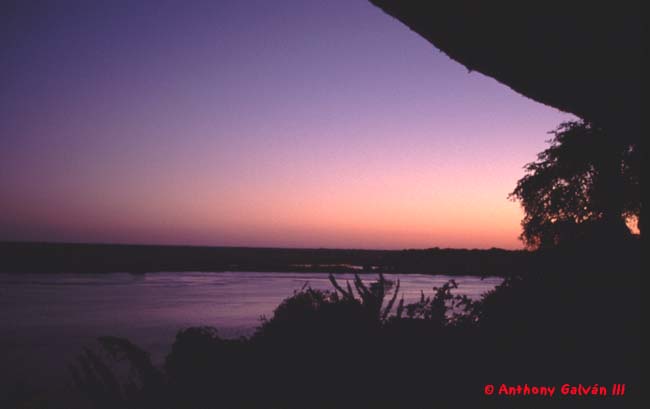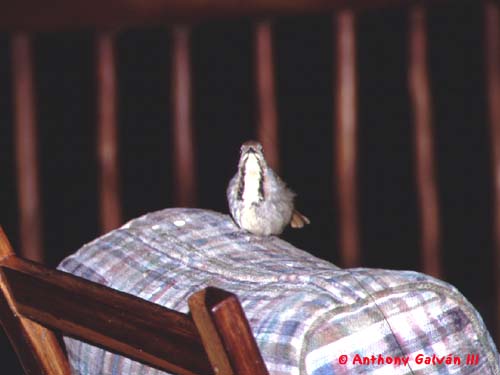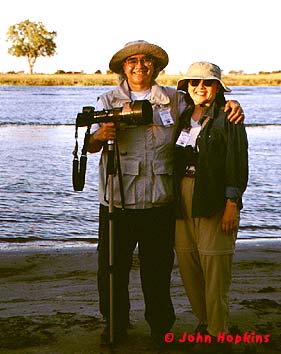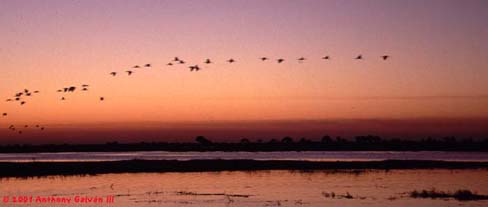
Mowana Lodge, Kasane, Botswana
June 17th - Father's Day 2001
After a well deserved night's sleep it's up at the crack of dawn. Once again, the Chobe River offers natural in its finest. As usual, the sunrise is spectacular.

And as usual, the lodge's balconey is filled with "LBJs" (little brown jobs) flying about and making their normal racket. The next surprise is that the drive leaves later today. So, we wander around and listen to the birds and watch the river wake up, all in good time

Kurrichane Thrush
This thrush decides to keep us company before breakfast. It's an easy one to recognize, just look for the moustache down the body.
Before we know it, it's time to hit the trail. Today we leave the lodge and river and go into Chobe National Park. It's cold and dark as we make our way to the park's entrance. Dawn is still a minutes away and we catch a glimpse of Hyenas crossing the road. And then, in the darkness we hear a lion's roar. This is not a good time to change a flat tire. We catch glimpses of the lion in the brush. It seems to be playing with us, running parallel to the road as we slow down to get a glimpse of it.
Hey, it's Father's Day! More surprises in bush.
Father's Day in Botswana

What did I do on Father's Day? I didn't stay home and watch tv, that's for sure! Click on the link above to see what I did.

And so we end the day with another great sunset over the Chobe River.
The Night Drive
But we still had one more thing to do that night. A night drive! Call us gluts for punishment but we were not going to let this opportunity slip by. So after getting back to the lodge we had 30 minutes to "freshen" up before we'd go out again. Freshen up meant getting a snack and more warm clothes. It's winter in Botswana in June and it gets cold other in the bush. Once again we were hitting the trail, this time at night.
What's a night drive? You go out into the bush at night. You have a big bright spot light. You drive slowly because you'll never know what you'll see, when you'll see it or how you'll see it. How means does it just appear in front of you or do you get some indication something is out there.
So off we went, Joan and I, Rose and Bob Clark and LT, our driver from the afternoon.
We left the lodge and proceeded down the road, not to the game preserve but another part of wild Botswana. The parks are closed at night, for good reason. Of course that doesn't mean you should be casual about walking down the road at night.
Within a minute of turning off the paved road we come upon a herd of dozing buffalo. I think we woke them up. They don't charge but they don't look too happy either. Scanning the road ahread and tree tops above us with the search light we saw Marabou Storks roosting on the tree tops. The Morticians from the Sky don't seem to mind us. The stay put.
Where's the pictures you ask? Unfortunately in photography there is this law of physics often referred to as the "Inverse Square Law." It defines how light (from a flash unit) will behave upon a subject (to be illuminate) to produce a perfectly exposed negative or slide. With all that said it means that for the average and even professional flash unit, the subject needs to be very close to reflect enough light to expose the film.
So, here's our scenario. We're in a Land Rover, driving along a dirt road at about 20 mph. There's a guide flashing a spotlight left and right trying to find a night critter by the "glow of their eyes." You know, it's the same thing as when you drive home and see a cat, dog or deer along side the road and see their eyes before you see them.
You see the two glowing orbs and say, "hey, there's a (fill in the blank)." So, here we are at 8pm Botswana time driving down a trail trying to find the "night life" which generally mean predators. When the spot light finds something it's normally for an instant. It take a very powerful flash of light to reach beyond 100 feet to illuminate the subject and properly expose the film. But I tried and tried through the evening.
What did we surprise or come upon?
Two elephants, one which splattered us with mud! A Roller (bird) which we surprised from its roost. It eventually found a branch and stayed put. A Civet cat and an African Wild Cat, Felis libyca, which is the grand daddy-mommy of our domestic cat! In fact, we saw two of them. But, before you think we're making all this up I did get a shot of a Suni, Neotragus moschatus, which wandered in front of our Rover at the right time and within the right distance. See those glowing eyes? That's proof the shot was taken with a flash, honest!

Suni - Neotragus moschatus
And so this is how we ended our second night in Africa and Botswana. We were tired. We were excited and there was still one more game drive in the morning before we left for Zimbabwe. Morning would not come soon enough for some of these happy campers. But, we tried to make the best of it. When we got back to the lodge most folks were by the pool star-gazing. We went into the dinning room and had dinner, at a civilized hour!
Back to home.
Book a Flight to Africa! © 2006 Anthony Galván
III